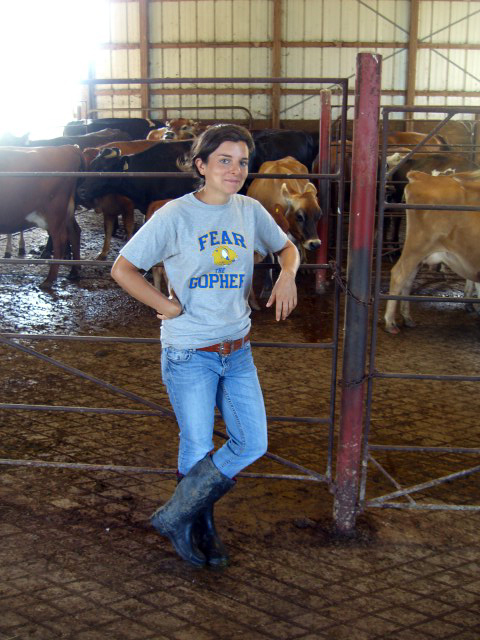Reimagining the Food Machine: A Millennial’s Leap of Corporate Faith
- by Sea Sloat
Full disclosure: I never, ever thought I would work for a corporation. Especially in the food industry.
And especially right after college, when I’m still relishing my jaded youth and my generation’s savior complex. But, I wonder: maybe the way we save the world isn’t just through our grassroots movements, non-profits, and starry eyes.

A Nebraska farm I worked on through WWOOF
So how did I get here? Upon reflecting on my choice to join the Bon Appétit family, I am reminded of author Julie Guthman’s claim in her book Weighing In that ours is a “culture of bulimia,” wherein the cycle of overconsumption begets excessive wastefulness. It’s a culture of contradictions: Farmers grow more than they can pick, supermarkets comply with arbitrary expiration dates, and restaurants toss uneaten meals. Such contradictions represent just how normalized we have become to the practice of overconsumption, and waste as a “necessary” byproduct. I have long seen corporations as the primary actors in making the cogs of this great waste machine continue to turn, while expertly hiding the exploitation of land and labor that makes this cycle possible.
As a student at Goucher College, a Bon Appétit campus, I was perplexed by the question of how to reimagine the machine. By my final year of school, I had been fortunate enough to have lived and learned in South America, Europe, and on small organic farms across the country that waste does not have to exist on such a massive scale in order for economies and communities to function and even enjoy abundance. I witnessed a different model, in which the value of food is fully realized.
When I discovered the Food Recovery Network (FRN) as a senior, I saw an opportunity to throw a wrench in the gears of the waste machine, so to speak. A student-operated food recovery solution to edible food waste at my small college was a grain of sand on a beach of food issues, but it allowed me to begin a relationship with Bon Appétit that pushed me to think beyond the world of nonprofit idealists as the only solution.
For me, the way to bring about change in the food system is not just about telling people where their food comes from so they can make more informed choices. It’s about educating the consumer and ensuring that this educated consumer has access to the healthier choice.
I contacted Bon Appétit Senior Fellow Nicole Tocco and Waste Specialist Claire Cummings to discuss starting a FRN chapter at Goucher College. Wholly expecting them to find some reason why the program couldn’t exist, I was prepared to duke it out, with lots of information about the legality of food recovery programs and functional examples of chapters at other campuses. I immediately regretted my antagonistic attitude. Instead of stalling me, Nicole and Claire advised me on how to navigate kitchen politics, the logistics of food safety, and most importantly provided encouragement. I was impressed with the amount of support I was offered from this “big, bad corporation” to do good. My understanding of the corporate machine was quickly being turned on its head.
In an unexpected turn of events, a millennial and a corporation had a long list of shared values. For me, the way to bring about change in the food system is not just about telling people where their food comes from so they can make more informed choices. It’s about educating the consumer and ensuring that this educated consumer has access to the healthier choice.
This requires a commitment to social responsibility that must run along every sector of the food industry. Wasted environmental resources, calories, and capital are the tragic outcomes of a culture of normalized overconsumption. The greater casualty, though, is the depreciation of the cultural importance we place on food, the people who grow it, and the artists that prepare it. The human value of food ends up in landfills, too. By fostering relationships between chefs and local growers through the Farm to Fork and the Imperfectly Delicious programs, and working to support farmworkers’ rights, Bon Appétit puts the human element back into its food.
I never thought I would work for a corporation, mostly because I did not think a corporation would ever take the risk of trying to implement the very same values I hold, or do so in an economically sustainable way. I am overjoyed and honored to be joining the Bon Appétit family, as we challenge each other to continue to reimagine the machine.